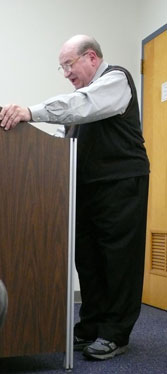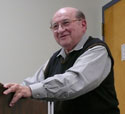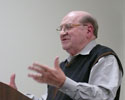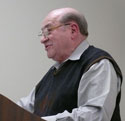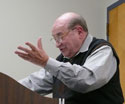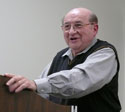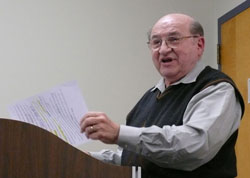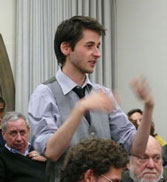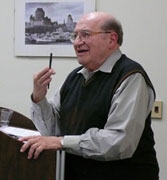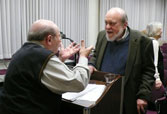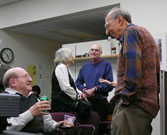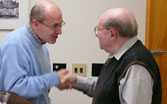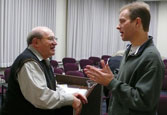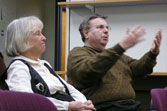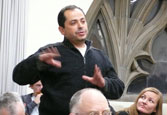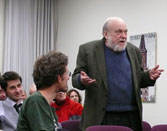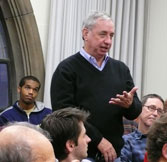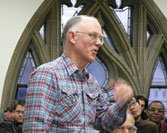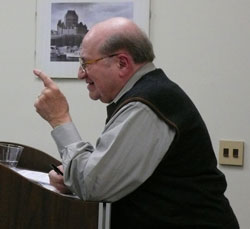
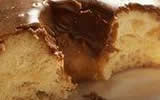
![]()
::: postdoc fellowships
::: senior fellowships
::: resident fellowships
::: associateships
![]()
being here
::: visiting
::: the last donut
::: photo album
::: center home >> being here >> last donut? >> 30 november 2007 |
Friday, 30 November 2007 We had seen very little of Adolf this term until earlier this week, when he came to hear Gordon Belot speak on Tuesday. Adolf and his wife Thelma had been on a grand tour through Asia and Europe that lasted for two and a half months. Its high point was when Adolf, the President of the International Union for the History and Philosophy of Science, delivered the Presidential Address at the 13th quadrennial International Congress of Logic, Methodology, and Philosophy of Science at Tsinghua University in Beijing. Adolf was well aware that many of us had not been in Beijing, so that we had not heard his talk. He decided that best solution was simply to give the talk again. A day was selected and a late afternoon start chosen, so that the event could proceed with more leisure than a lunchtime talk. Final preparations had been underway through the week. Adolf sent a sheet with a "Glossary of Acronyms." This we were to project on a screen behind Adolf while he read his paper. He sent me a page and half of biographical information to assist me in my introduction. The phone seemed to ring quite often in Joyce's office as other smaller details were arranged and settled. We watched the room fill as the appointed time approached. Both Adolf and Thelma had arrived half an hour early. Thelma noted with pride that her grandson, now a freshman at Pitt, would come and bring his "fraternity brothers" with him. Adolf had protested to him that he would surely not enjoy such a detailed, technical talk. But Thelma quickly interjected that he just wanted to see the Great Man perform. I felt sure that Adolf, like any doting grandfather, must be tickled by that prospect. I found a moment to lure Adolf into agreeing that his Beijing presentation had merely been a dress rehearsal for today's event. It just the light-hearted quip I needed for my introduction. Now Adolf rose to speak. His topic was "Why is there a universe AT ALL, rather than just nothing?" I sometimes muse at how far philosophical discourse drifts from common sense. The test is an airplane ride. When the person sitting next to you wonders what you do, what reaction will you get when you explain "I've been working on the question of why there's something rather than nothing"? It is a familiar occupational hazard for philosophers. Of course Adolf could correctly protest that this question was not of his doing. Others had conceived it and misused it. All he was up to was undoing their tangled thought. The culprits are theistically inclined philosophers, such as Oxford's Richard Swinburne, whose name appeared repeatedly as Adolf spoke. They used the question as a launching point for an argument for the existence of god. The question, they asserted, needs an answer and that answer is that there is a universe because it is brought into being by a creating god. That notion was part of a venerable tradition extending back to Aquinas and Descartes. It held that the continued existence of anything required the continued attention of god. Should that attention lapse, well--"poof"!
How are we to proceed from PEQ to the existence of god? PEQ only has useful force for that purpose if we are able to convince ourselves that the existence of anything at all--matter, space, time--is amazing. Swinburn and another Oxford philosopher, Derek Parfit, did find contemplation of PEQ to lead inexorably to just such a profound astonishment, Adolf assured us. No question, they concluded, is more sublime than the question of why there is anything at all. That necessary presumption of astonishment, so eagerly sought by the theologically-minded, was a target for great scorn from Adolf. It is an "insidious, peremptory assumption," Adolf assured us, and that was just the quiet beginning of a much longer denunciation that approached its crescendo too quickly for me to jot down its chords. Adolf's tone was unmistakable and quite intentionally so. At one moment he paused and looked up from his text to say "I hope my tone of voice is sufficiently irreverent to make clear what I think of these viewpoints!" It was. Reading Adolf and hearing him are two quite distinct experiences. I have tried to describe the difference in an earlier report. Adolf's sentences are long, heavily laden with superlatives and grammatically perfect. They are ponderous to read to yourself. When Adolf reads them, they come alive. They emerge slowly, with careful emphases, with tiny, theatrical pauses and with facial expressions that span a range from puzzlement to fury that any actor would envy. All that perfectly balances the superlatives. We have no doubt of the passion, power and care that went into formulating each of the sentences that were now being offered for our scrutiny, contemplation and amusement. Now that we knew Adolf's view and strategy, it was time to turn to the business of real philosophy: thesis and argument. Adolf began the operation of methodically laying bare the assumptions needed to arrive at this insidious assumption. One major strand of thought was the notion that nothing at all was simpler than something. Then, on the grounds of preferring the simpler, we should take a state of complete nothingness as our default. This was an easy target. The notion of simplicity is rife with trouble. At the beginning of philosophy, Thales has proposed the ancient theory that everything is made of water. That theory is "staggeringly simpler" than modern chemical theory. But that is of no avail. Thales' theory is wrong. Adolf proceeded to add more woes than I can note here. Simplicity could only be a guide if we are comparing hypotheses of equal scope and content. But, Adolf noted in another complaint, Swinburne and others did not employ this restriction. Now, Adolf assured us with a triumphant smile, he had presented all these ideas in a talk at Oxford. Swinburne had been present and, Adolf reported, pausing to look up from his manuscript and beam as he delivered the line, Swinburn had "publicly raised the white flag." Adolf's head returned to his script. Few philosophers read their papers well. Adolf is a welcome exception. Indeed one quickly loses the sense of him reading. I was reminded that he is reading when he turned his page and I glimpsed the text from which he reads for just a moment. It is a typescript, heavily marked up with lines and arrows and bright yellow highlighter. Adolf's next target is Leibniz, who had devoted considerable effort to a defense of PEQ. Part of it resided in an appeal to the simplicity of nothing. Another derived from Leibniz's Principle of Sufficient Reason "PSR." There has to be a sufficient reason for why something is precisely this way rather than that. Such reasons seem to be missing for any particular configuration of the world and the door is opened to asking PEQ. Adolf made quick work of PSR. Quantum theory contradicts it directly. The time was running short. But Adolf had one final rebuttal to the the notion that it is natural or spontaneous for our universe not to exist. It was an empirical question, he averred, and should be settled empirically. He had two illustrations in modern physical cosmology that pointed against the notion. Did he have time to proceed? I assured him he'd better on pain of having to explain each example multiple times after the talk. The illustrations were two standard entries in our catalog of recent cosmological theories, a big bang cosmology and a steady cosmology. In the first, matter, idealized as "dust," persists by virtue of the laws of the physics. There is no need for any supernatural agency to prevent the dust lapsing into nothingness. In the second, steady state cosmology, matter pops into being continuously. It does it spontaneously without any supernatural agency. That contradicts the age old "Nihil ex nihilo fit." Or, more colorfully, you cannot get blood from a stone. Bondi and Gold, the originators of steady state cosmology, had done just that with the accretion of hydrogen from nothing. In keeping with our Friday, mid afternoon timing and leisurely pace, we had arranged for light refreshments in our little lounge. That gave everyone a chance to stretch their legs, eat a cookie and sip some coffee before reconvening for questions. With only a little effort, I shepherded the little clusters of people back into the seminar room to settle down for questions. Adolf is a formidable speaker and, as I called for questions, it was clear that this audience was loath to engage him head on. There was no eager sprouting of hands. Rather we all shared the same thought. After a presentation that powerful, who wants to rouse the hornet's nest by poking it with an ill-considered question? The questions that came were gentle and were dealt with gently. Then it was Bob Griffiths' turn. Bob is a physicist from neighboring Carnegie Mellon University and often drops by when we have talks on philosophy of quantum theory. He was here now as a physicist and Christian, determined to engage Adolf. And he did. Why are you refusing to give proper consideration to the question of PEQ, he insisted. It has a perfectly good answer. "God created the Heavens and the Earth." I could see from Adolf's smile that Bob was a familiar combatant. They had been engaging for decades, Adolf later told me. The battle was joined. "I don't refuse to consider the question," John D. Norton Adolf Grünbaum |
